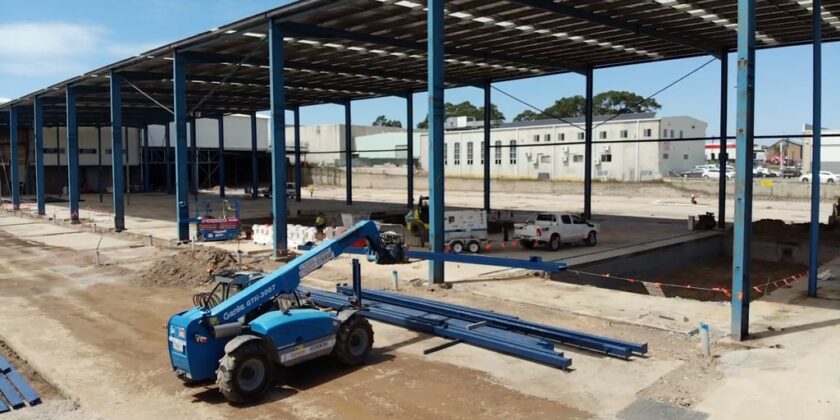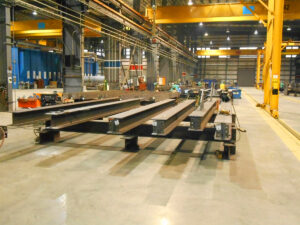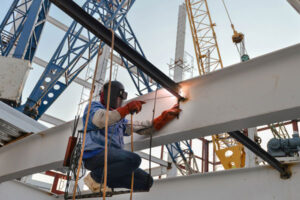India has been a hub of industrial innovation and manufacturing expertise. Among its many industries, steel fabrication stands out as a cornerstone of the nation’s economic and infrastructural development. In this comprehensive article, we will delve into the world of steel fabricators in India, exploring their significance, technological advancements, and the symbiotic relationship between steel fabrication and Pre-Engineered Buildings (PEB).
Importance of Steel Fabrication
Steel fabrication involves the transformation of raw steel into predefined shapes and sizes to be used in construction and other industrial applications. In India, this industry plays a vital role due to its contributions to infrastructure development, automotive manufacturing, and even the defence sector. The country’s rapid urbanization and industrialization have fuelled the demand for high-quality steel structures, making steel fabricators indispensable.
Evolution of Steel Fabrication
Historically, steel fabrication in India has evolved from basic manual processes to highly automated and technologically advanced operations. Initially, craftsmen manually shaped steel, which was labour-intensive and time-consuming. With the advent of technology, Computer Numerical Control (CNC) machines and automated welding processes have revolutionized the industry, enhancing precision and efficiency.
Leading Steel Fabricators in India
Several companies have established themselves as leaders in the Indian steel fabrication industry. These firms are known for their state-of-the-art facilities, skilled workforce, and commitment to quality. Some of the prominent names include:
- Larsen & Toubro (L&T): L&T is a giant in the engineering and construction sector. Their steel fabrication division is renowned for delivering high-quality steel structures for various industries, including power, infrastructure, and defence.
- Tata Steel: As one of the oldest and largest steel producers in India, Tata Steel has a significant presence in the steel fabrication sector. Their advanced manufacturing facilities and innovative techniques set them apart in the industry.
- JSW Steel: JSW Steel is another major player known for its modern fabrication techniques and sustainable practices. They cater to a wide range of industries, from construction to automotive.
Technological Advancements in Steel Fabrication
The steel fabricators in India have seen significant technological advancements over the years. These innovations have not only improved the quality and precision of fabricated steel but have also reduced production time and costs. Some key advancement includes:
- Automated Cutting & Welding: Modern steel fabrication relies heavily on automated cutting and welding processes. CNC machines have replaced manual cutting, ensuring precise and consistent cuts. Automated welding robots enhance the quality of welds and increase production efficiency.
- 3D Modelling & Simulation: The use of 3D modeling software has revolutionized the design phase of steel fabrication. Engineers can now create detailed models and simulate various scenarios to optimize the design before actual fabrication begins. This reduces errors and material wastage.
- Laser Cutting Technology: Laser cutting is another significant advancement in steel fabrication. This technology allows for intricate and precise cuts, enabling the creation of complex designs that were previously impossible with traditional methods.
Steel Fabrication & Pre-Engineered Buildings (PEB)
Understanding Pre-Engineered Buildings (PEB)
Pre-Engineered Buildings (PEB) are structures built using prefabricated steel components. These buildings are designed and manufactured in factories, then assembled on-site. PEBs are known for their cost-effectiveness, speed of construction, and flexibility in design.
Role of Steel Fabrication in PEB
Steel fabrication is integral to the construction of PEBs. The prefabricated components used in PEBs, such as beams, columns, and trusses, are all products of advanced steel fabrication processes. The precision and quality of these components directly impact the structural integrity and durability of the final building.
Advantages of PEB
- Cost-Effective: PEBs are generally more affordable than traditional construction methods. The prefabrication process reduces labor costs and minimizes material wastage.
- Quick Construction: Since components are manufactured off-site, the on-site assembly is quick and efficient. This is particularly beneficial for projects with tight deadlines.
- Design Flexibility: PEBs offer a high degree of design flexibility. They can be easily customized to meet specific requirements, making them suitable for a wide range of applications.
Applications of Steel Fabrication in Various Industries
- Construction: The construction industry is one of the primary consumers of fabricated steel. Steel structures are used in residential, commercial, and industrial buildings. Their strength, durability, and versatility make them ideal for constructing high-rise buildings, bridges, and industrial plants.
- Automotive: In the automotive industry, steel fabrication is used to manufacture various components, including chassis, body frames, and engine parts. The precision and strength of fabricated steel ensure the safety and performance of vehicles.
- Aerospace: The aerospace sector demands high-precision and lightweight components. Steel fabrication techniques are employed to create parts that meet the stringent standards of the industry, contributing to the safety and efficiency of aircraft.
- Defence: The defence industry relies on steel fabrication for the production of military vehicles, weapons, and infrastructure. The robustness and reliability of fabricated steel components are crucial for national security.
Future of Steel Fabrication
The future of steel fabricators in India looks promising, with continuous technological advancements and increasing demand from various industries. The government’s focus on infrastructure development and initiatives like “Make in India” are expected to drive growth in the sector.
- Adoption of Green Technologies: There is a growing emphasis on adopting green technologies in steel fabrication. This includes using renewable energy sources, recycling waste materials, and implementing energy-efficient processes.
- Integration of Industry 4.0: The integration of Industry 4.0 technologies, such as the Internet of Things (IoT), Artificial Intelligence (AI), and Big Data, is set to revolutionize steel fabrication. These technologies can enhance predictive maintenance, optimize production processes, and improve overall efficiency.
- Expansion of PEB Market: The market for Pre-Engineered Buildings is expected to expand further, driven by the need for cost-effective and rapid construction solutions. This will, in turn, boost the demand for high-quality steel fabrication.
Conclusion
Steel fabrication is a dynamic and essential industry, playing a critical role in the country’s economic and infrastructural development. With continuous technological advancements and the growing popularity of Pre-Engineered Buildings, the future of this industry looks bright. By addressing challenges and embracing innovation, steel fabricators in India are poised to lead the way in delivering high-quality, sustainable steel structures that meet the diverse needs of various sectors.




